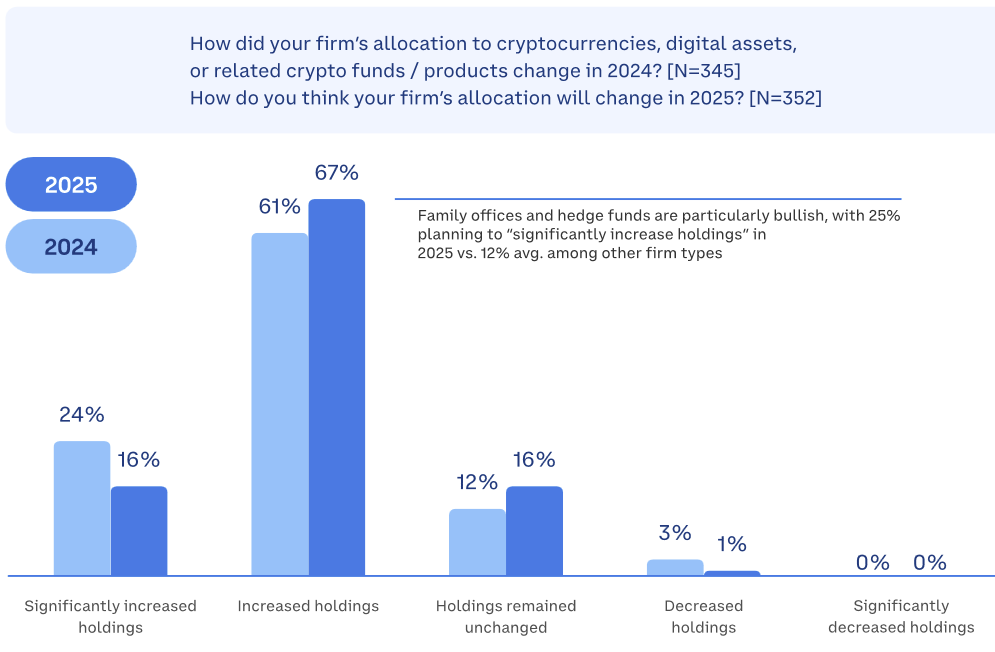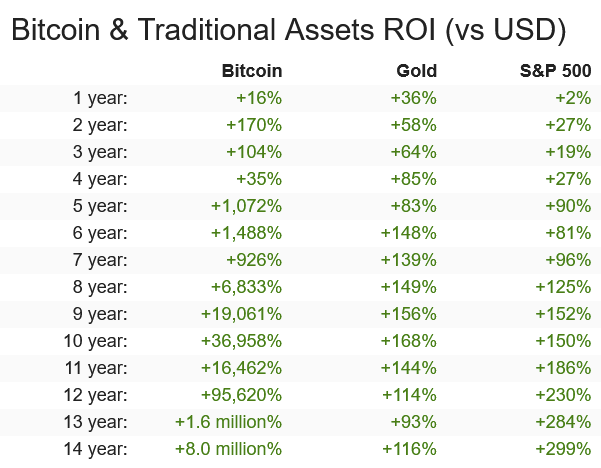
Institutional Bitcoin Ownership: Why Is It at an All-Time High?
June 25, 2025





Institutional Bitcoin ownership has surged in recent years, driven by favorable regulation and backing from traditional finance giants, including endowments and pension funds, while state-level investments in Bitcoin are also on the rise.
Read on to learn more about institutional Bitcoin ownership and how it has been impacting the Bitcoin market.
TL;DR
- Institutional Bitcoin ownership is at an all-time high, with public companies, private firms, miners, and ETFs collectively holding over 12% of the total BTC supply.
- Key drivers include: Bitcoin’s long-term performance, regulatory clarity, ETF approvals, and increased use as a portfolio diversifier and potential safe-haven asset.
- Major players like BlackRock, Strategy (formerly MicroStrategy), and Fidelity lead the charge, signaling growing trust in Bitcoin as a treasury and investment asset.
- The trend is accelerating, with surveys showing 85% of institutional investors increased digital asset allocations in 2024–2025, and more than half planning to allocate over 5% of their AUM to crypto.
The Current State of Bitcoin Institutional Ownership
A quick glance at the numbers reveals the growing significance of institutional investors in the Bitcoin market.
Per Bitcoin Treasuries data, currently, public companies hold 693,036 BTC, private ones own 398,323 BTC, and Bitcoin mining companies possess 98,020 BTC in their treasuries. Adding up to almost 1.19 million BTC, this represents nearly 6% of the total BTC supply.
If you add spot BTC exchange-traded funds (ETFs) to the equation, as these investment vehicles are also often used by institutional investors, this percentage increases to around 12%. To compare, in August 2024, when the earliest historic data of Bitcoin Treasuries can be found, it was still below 10%.
EY’s 2025 Institutional Investor Digital Asset Survey 2025 supports this positive trend. 85% of respondents increased their allocations to digital assets and related products in 2024 and have continued to do so in 2025. Moreover, 97% of the respondents allocated funds specifically to Bitcoin.
59% of respondents plan to allocate over 5% of their assets under management (AUM) to cryptoassets in 2025, with US respondents and hedge funds indicating higher allocations than other segments (64% and 67%, respectively).

Key Factors Driving the Growing Institutional Ownership of Bitcoin
The growing institutional ownership of Bitcoin can be attributed to various factors, some of which include:
Bitcoin’s Historical Performance & Growth Potential
Despite multiple, yet increasingly smaller, downturns, Bitcoin’s value has been steadily increasing over the years, with its most recent all-time high (ATH) reaching $109,000 in late January 2025.
Moreover, BTC has outperformed both gold and S&P 500 on multiple timeframes.
Meanwhile, both Bitcoin and traditional finance analysts estimate that recent BTC adoption trends might put the price on a trajectory towards hundreds of thousands of dollars.

Approval of Bitcoin ETFs
Another factor providing a substantial push towards institutional adoption of Bitcoin was the approval of a spot BTC ETF by the US Securities and Exchange Commission (SEC) in January 2024, providing institutions with a seamless, familiar, and regulated way to gain access to this asset.
With BlackRock subsequently entering the spot BTC exchange-traded product market in Europe in March, these investment instruments are becoming available for a broader network of institutional investors.
The Need for Portfolio Diversification
Bitcoin, as a new asset class with the potential to deliver long-term value, has asserted itself as a compelling choice for portfolio diversification.
However, the historical correlation of BTC and the stock market is a complex issue, as this correlation often increases during stressful periods for stocks, but during Bitcoin bull markets, BTC can often move more independently from traditional markets.
A Potential Safe-Haven Asset
While the dominant narrative seems to be that Bitcoin is a risk-on asset, more investors are beginning to see BTC as a risk-off asset, which is also supported by statements from BlackRock.
Therefore, while Bitcoin’s results as a hedge against inflation have been mixed depending on what timeframe you’re looking at, many investors position it as a hedge against currency debasement.
Moreover, as a neutral and decentralized technology, Bitcoin can also potentially offer protection from geopolitical woes.
More Regulatory Clarity
Regulatory ambiguity in the cryptoasset industry has previously stood in the way of the wider adoption of Bitcoin. However, as governments around the world establish clearer and more supportive regulations, Bitcoin is set to strengthen its position as a respectable and accepted asset class, encouraging more institutional investments.
Major Players Shaping Bitcoin Institutional Ownership
The following companies are among the most recognizable institutional Bitcoin holders:
BlackRock
Once a Bitcoin skeptic, BlackRock’s CEO, Larry Fink, has turned into one of its staunchest advocates, with his company becoming the operator of the biggest spot Bitcoin ETF. Currently, on behalf of its investors, iShares Bitcoin Trust ETF (IBIT) holds around 571,000 BTC, which is 2.7% of the total BTC supply.
Strategy
A business intelligence firm turned Bitcoin-powerhouse, Strategy (formerly MicroStrategy) holds Bitcoin directly as a corporate treasury asset. Since buying the first Bitcoin for the company, its co-founder and executive chairman (and former CEO), Michael Saylor, has never halted. Now, Strategy holds 528,185 BTCs, or 2.5% of the total supply of Bitcoin.
Fidelity Investments
Another prominent institutional Bitcoin holder, Fidelity Investments, is a major asset manager that recognized Bitcoin’s appeal in 2017 when it opened its digital assets services. In 2024, it also started its own spot Bitcoin ETF, which is currently managing 196,979 BTC. Recently, the company has launched an individual retirement account (IRA) plan that lets clients invest directly in Bitcoin.
ARK Invest
Cathie Wood’s firm is heavily invested in Bitcoin ETFs and has been a strong advocate for institutional adoption. In fact, Wood is one of the most optimistic supporters of Bitcoin, who in February 2025 doubled down on her prediction of Bitcoin at $1.5 million, citing the growing institutional adoption. ARK Invest’s BTC holdings currently stand at 47,151 coins.
Samara Asset Group
Finally, we at Samara Asset Group currently hold 540 BTC as our primary treasury reserve asset and aim to accumulate as much BTC as possible. Moreover, we have investments in Bitcoin infrastructure companies as we believe in seeding the best builders and fund managers in this space.
Bitcoin & Institutional Investors: What Lies Next?
The success of products like spot Bitcoin ETFs could lead to the development of more Bitcoin-based financial products, which could further fuel institutional Bitcoin ownership.
What's more, Bitcoin may establish itself as a popular collateral asset in the lending markets, which could fuel the growth of the Bitcoin-backed lending market.
FAQs
Why is BlackRock’s institutional Bitcoin ownership important?
BlackRock is the world’s largest asset manager with over $10 trillion in assets under management. In 2021, the firm took its first steps towards Bitcoin adoption by adding Bitcoin futures as an eligible investment in two of its funds, but it was the launch of iShares Bitcoin Trust (IBIT) ETF in 2024 that cemented its entry into the Bitcoin market. BlackRock’s institutional Bitcoin ownership sends a clear message to other institutional investors and signifies a massive shift in perception among major organizations.
Will institutional ownership make Bitcoin less volatile?
Wider institutional adoption may help alleviate some of Bitcoin’s volatility, which has been trending downward since the advent of institutional adoption. As institutional adoption grows and the asset matures, Bitcoin is positioned to be a more reliable asset class. A major reason is the fact that institutional investments via ETFs encourage long-term holding rather than short-term trading, which reduces market volatility.
Who is the largest institutional holder of Bitcoin?
The largest institutional holder of Bitcoin on its balance sheet is a U.S.-listed company, Strategy, with 528,185 BTC in its corporate treasury. The company keeps accumulating BTC by spending billions of USD on new purchases. Meanwhile, BlackRock has 571,000 BTC. However, these coins are custodied on behalf of their ETF investors.
Disclaimer: The information provided in this article is for informational purposes only and does not constitute financial, investment, tax, or legal advice. Nothing contained herein should be interpreted as a recommendation to buy, sell, or hold any investment or security, including Bitcoin. Readers should conduct their own research and consult with a qualified financial advisor before making any investment decisions. Samara Asset Group is not responsible for any losses or damages resulting from reliance on the information provided.

